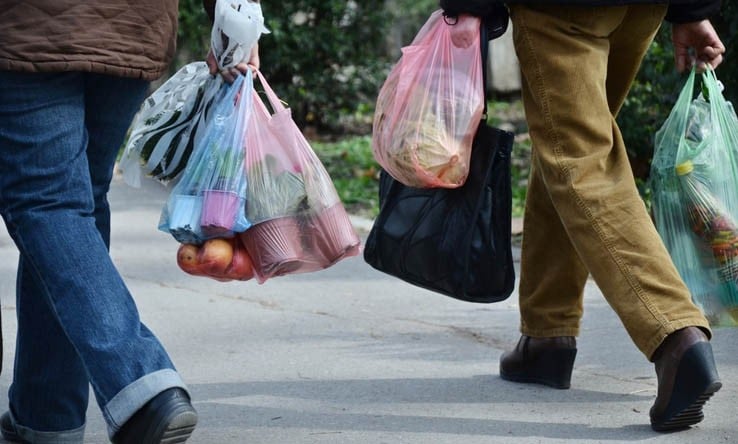
The ban on plastic bags in Islamabad should be followed by similar action in the provinces. An effective implementation strategy is essential

Imagine you wake up one day and find yourself bringing your grocery in a jute, cotton or paper bag. Is this unimaginable? To me, it’s not. When I recall my childhood days, I can remember my grandparents using a cotton bag for grocery, instead of a polythene bag. Why have we reached the point where every person is using 397 plastic bags a year? We need to find out where it began.
From 1965 to 1975, the plastic industry flourished in Pakistan. That’s where the use of plastic bags began. Even today, the industry is growing at an average rate of 15 percent. Report says about 200,000 labourers are directly associated with plastic-producing units and 600,000 people are indirectly working for the industry.
Polythene bags are preferred because they are light weight, low-priced, durable and easily available. According to one estimate, Pakistan has more than 8,000 plastic bag manufacturing units, mostly concentrated in Lahore followed by Karachi, Peshawar and Faisalabad.
Based on its composition, a plastic bag takes 10-1000 years to decompose. In most cases, it is used only once. We know that it clogs drains, is a high risk for marine life, pollutes water and air, ultimately causing health problems for humans. Keeping in mind the harm plastic does to our environment, the government of Pakistan decided in 2013 to regulate manufacturing, import, sale and use of non-biodegradable plastic products for the capital city, Islamabad. As a result, some of the big shopping malls started using cotton and paper bags.
Now the government has decided to ban plastic bags in Islamabad from August 14. Of course, the ban would affect the plastic industry, labour and consumers.
The government has followed the Kenyan model in targtting "No plastic bag in Capital Territory". Kenya’s GDP stands at $163.1 billion whereas Pakistan stands at $305 billion. If economies like Kenya can implement their law effectively Pakistan, too, can do so.
Kenya started its ban on plastic bags in the year 2017. Heavy fines ($upto 40,000) and four year’s imprisonment were introduced in case of use, import or manufacturing of plastic bags. Kenyan’s authorities arrested many violators and imposed heavy fines on them for not complying with the law. Many shops and markets were shut down as well. Within 8 months of the proactive implementation by the authorities, visible difference was observed in terms of littering and bags found in animals’ stomachs.
The media played a big role. The Kenyan government faced the challenge from retailers and manufacturers who demanded cheap alternatives to run their business. Once the government had sensitised them, many of them came up with alternative practices. The plastic manufacturing associations were given time to incorporate eco-friendly techniques for plastic waste management and production of plastic bottles. The companies are now involved in waste management. Burning of plastic bags in the open has also declined significantly. From July 2019, Kenya has also started heavy fines, upto $40,000, for tourists entering the country with plastic bags.
Now the Ministry of Climate Change has to implement the law effectively. Anyone seen using plastic bag in Islamabad will face a penalty of Rs5,000. A vendor using a plastic bag will face a fine of Rs10,000. Since there is only one industrial unit based in Islamabad, there is not much pressure on the government against this ban. The industry will face fines upto Rs50,000 to Rs1 million, if it does not comply with the regulations.
To begin with, the ministry will distribute 10,000 cotton and biodegradable bags. It has a media strategy for a massive awareness raising campaign. The mainstream media as well as social media are being used for raising awareness. Tourists should be aware that fines would be imposed if they are found not complying with the law.
Brands, grocery stores, and Sunday markets in Islamabad will have to use alternatives to plastic bags. The Federal Environmental Protection Agency is to enforce the regulation. Enforcement will likely not be very challenging because of the relatively high literacy rate. However, plastic waste management is still a big issue. The ministry and Capital Development Authority (CDA) have to be proactive and provide training in waste segregation, collection and proper disposal.
The ministry also intends to take the provinces on board regarding the ban on plastic bags. That is where the real challenge lies. Most plastic bag producing industries are concentrated in Lahore, Faisalabad and Karachi. Plastic Manufacturer’s Association has reservations on this ban. The government may like to take a holistic approach to the management of plastic waste, its recycling, and circular economy.
The ban on plastic bags appears to be a wonderful initiative. Its enforcement will define its scope for other provinces. Still, it can be hoped that in the next few years Pakistan would become a country free of plastic bags.
Individual efforts also mean a lot. Every person saying no to plastic bags lessening the burden by 397 bags a year. To make implementation more effective, the government should encourage investment in alternatives to plastic bags. Many countries are now using paper bags for grocery. For other plastic products, industries should be taxed heavily to discourage its import.
The writer is an environmental expert based in Islamabad. She tweets at @S_Maryam8